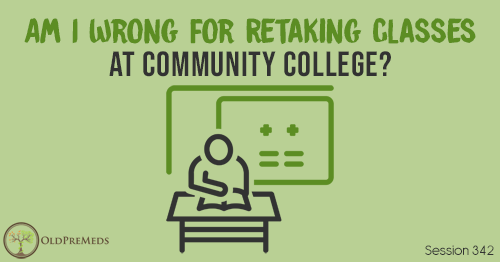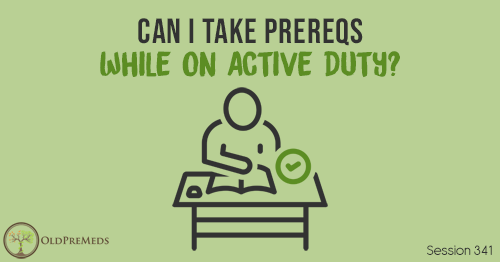Apple Podcasts | Google Podcasts

Session 45
In today’s episode, I’m joined once again by Rich, as we take questions directly from the Nontrad Premed Forum. We’re going to outline possible routes to take to get into medical school when your GPA is too low to get into a postbac program.
Listen to this podcast episode with the player above, or keep reading for the highlights and takeaway points.
OldPreMeds Question of the Week:
The poster is a recent BS graduate from a school in California, and medical school has always been on their radar, but they graduated with a 2.86 GPA feeling they have no chance. They took too many units out of a worry that they wouldn’t be able to graduate in four years. They got bad grades in gen chem and organic chem (D’s the first time), then repeated those and still didn’t do well (B in gen chem, C in organic chem).
Their premed advisor at their school told them to give up their med school dreams. They’re still volunteering and still want to go to medical school, but they haven’t taken the MCAT yet. They’re looking at taking a postbac, but the GPA requirements are too high for what their GPA is.
What is a student supposed to do when you have a low GPA and you’re looking for a postbac, but they have minimum requirements for GPA?
Their premed advisor at their school told them to give up their med school dreams.Click To Tweet[Related episode: Is the Role of Your Premed Advisor to Tell You No?]
Postbac Options With a Low GPA
Many students see a GPA requirement and don’t see anything past that. Here are two paths to look into:
- Start with an informal postbac.
- Just take classes as a non-matriculated student at whatever school you can to improve your GPA. You don’t need to apply to any program to take classes as a non-matriculated student.
- The prerequisites are not the same as a Special Masters Program (SMP).
- You may have to go through an informal postbac, then a formal postbac, and then an SMP to get into an MD school—this is a long and expensive path.
- Go to a DO school.
When you repeat a course, only the last retake will count in your GPA for the medical schools.The schools will know you repeated it, but the GPA they will consider for entrance will be the better score.- Update: Unfortunately, DO schools no longer do grade replacement. When you repeat a class, your old and new grades will now be averaged together, same as it is for MD schools.
- Assuming you want to stay in California, there is limited space in postbac programs and even limited space for informal postbacs. California is probably the most competitive state for medical school.
- DO school may just be a better path in terms of time, chances, and money.
Going to a Caribbean school
This should be your very, very last resort. The quality of education is not our concern, but it’s their way of taking students and your chances for matching into a residency in the US.
Do not think about the Caribbean until you’ve gone through two complete cycles, both MD and DO, with a break in between for repair and enhancement. One of the most common mistakes is students reapplying too soon.
Don't think about Caribbean medical schools until you've gone through two complete cycles, both MD and DO, with a break in between for repair and enhancement.Click To TweetMajor Takeaway from This Episode
Do an informal postbac first if you can’t get admitted into a formal postbac based on your grades. Don’t take the MCAT until you’ve got your GPA up and ready. If you don’t get in after the postbac, try a Special Master’s Program.
You can also consider other medical professions such as NP and PA, as you would still be part of the health care team. However, if you want to be a physician, my advice is to be a physician. For more on deciding between PA and physician, listen to Session 79 of OldPreMeds Podcast.
Links and Other Resources
- Check out my Premed Playbook series of books (available on Amazon), with installments on the personal statement, the medical school interview, and the MCAT.
- Related episode: What MCAT Score Do I Need If I Have a Low GPA?.
- Related episode: Interview with Columbia Postbac Premed Program.
- Need MCAT Prep? Save on tutoring, classes, and full-length practice tests by using promo code “MSHQ” at Blueprint MCAT (formerly Next Step Test Prep)!











